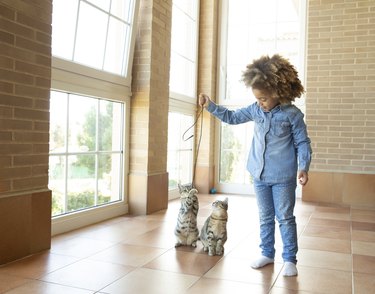Bringing a new cat into your home is exciting. Most new cat owners are looking forward to building a loving relationship and this can lead to bringing a cat home and giving them a free run of the home. Unfortunately, this can be very overwhelming for a new cat or kitten — and can lead to a harder adjustment period for the cat.

Video of the Day
Bringing home a new cat
When you first bring home a new cat, you want to limit the space in your house that your cat has access to. Giving your cat a small, comfortable, and confined area of your home where they aren't influenced by other cats or animals in the house allows them the space to adjust to you and your family without getting overwhelmed. This also provides you an opportunity to observe your new cat more closely.
Video of the Day
When bringing them home, create one space in your home that can "belong" to your cat when they are getting introduced to your house. A bedroom, laundry room, or even a bathroom can work well for this. Try to pick a quiet location in your home where your cat can have some quiet time and privacy, especially if you have a loud or active home. Also, make sure the space that you give your cat is one you can keep other pets away from during the adjustment period.
Cat-proof the safe room
Before bringing your new cat home try to cat-proof the room so it will be safe for them. Make sure there aren't any spaces that your cat could get into and become hurt or trapped. For example, check that there aren't any holes in a mattress your cat could get into, furniture they could get stuck behind where it would be hard to reach, or holes in cabinets that could allow your new cat to get into your walls.
You may also want to secure any cords and wires to prevent cats from chewing on them. It's also a good idea to remove breakable objects from the space or put them in locations where your new cat won't be able to knock fragile objects over.

Making a safe space for a new cat
Before bringing your cat home try to have your cat's private space set up. In addition to cat-proofing the room, you'll want to make sure your cat has everything they need in the space. At a minimum, make sure your cat has a bed or comfortable place to sleep, fresh water, food, and at least one litter box.
The idea is to create a space for your cat to feel safe and begin to decompress. Having a space your cat feels comfortable in can also help your cat to start to form relationships with new members of the family and feel secure in their new home.
Engagement
As your cat is adjusting to your home try to avoid forcing your cat to interact directly with you. Unless your new cat has a medical condition that requires treatment, let your cat control when and how they engage directly with you. The safe space provides your cat with a physically safe space, but also an emotionally safe space to decompress and get used to your new home, and you.
Spend time in your cat's safe space doing normal quiet activities like watching videos on your phone or reading a book to let your cat get used to the sight and sound of you. This can support your new cat, at their pace to start to solicit affection and engagement with you.

Introduce cats slowly
If you have other cats, dogs, or pets in the home, giving your cat this safe space is extra important. Don't allow the other pets into your cat's safe room while your new cat is adjusting to the home. A big benefit of the safe space room is that your cat can adjust to the sounds and the scents of the other animals without having to interact.
Your new cat being in their safe room also allows the other pets a chance to get used to the smells of the new cat while giving everyone space. This distanced introduction can help ease tensions and make the actual introductions when they happen in the future go more smoothly.
Cat enrichment needs
When creating a safe space for your cat, be sure to consider your cat's enrichment needs. It's important to also provide enrichment activities for your new cat. Cardboard boxes to hide and play in can be an easy way to provide enrichment. You'll also want to provide interactive cat toys, and if possible, access to different heights with cat trees or cat shelves.
Giving your cat access to toys, places to hide, and opportunities to climb can help cats feel safe and adjust to their new environment more easily. You can also hide treats and toys within the safe space which can provide a foraging game and activity for your new cat. This can help your cat relax and adjust to their new space, reduce stress, and encourage play.

In summary
When you bring a new cat home it's important to not overwhelm them with too much stimulation. Getting a new cat is very exciting for us but getting used to a new family can be stressful and overwhelming for cats. Providing your cat with their own private space to adjust to the smells, sounds, and patterns of a new family can decrease stress around introductions and help them adjust more quickly. You won't have to keep your cat in their safe room forever, but starting your new cat in a safe space can help you and your cat build a stronger relationship from the start.